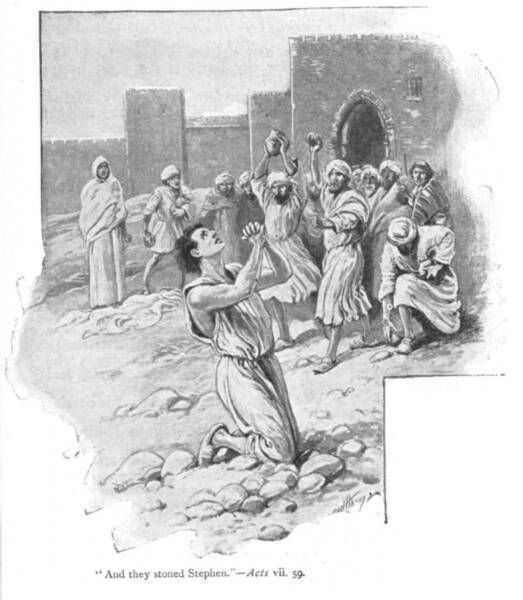1st Timothy 1:15
1st Timothy 1:15-16 (see also Romans 5:8; 1st Corinthians 15:9)
It is a trustworthy statement, deserving full acceptance, that Christ Jesus came into the world to save sinners, among whom I am foremost of all. Yet for this reason I found mercy, so that in me as the foremost, Jesus Christ might demonstrate His perfect patience as an example for those who would believe in Him for eternal life.
George Bryson: “I take this to mean that if you are a sinner, He came to save you.” (The Dark Side of Calvinism, p.167, emphasis mine)
J. Vernon McGee: “Under the Law the best man in the world is absolutely condemned, but under the gospel the worst man can be justified if he will believe in Christ.” (Thru the Bible commentary series: First and Second Timothy, Titus and Philemon, p.27, emphasis mine)
James Leonard: “Paul seems to delimit sinners as the object of Christ’s saving by pointing to himself as the worst possible example of them. The implied argument is that if Jesus came to save Paul, then surely Christ came to save everyone. The point is emphasized by Paul’s employment of the faithful saying refrain, with the additional qualification that it is worthy of all acceptance. In retrospect, it is easy to imagine that Paul felt his point needed this additional emphasis precisely because a certain element within Ephesus was posing some sort of soteriological elitism. Perhaps this may also explain Paul’s enigmatic appeal to his ignorance as the basis for God’s outpouring of his grace, an excuse which is otherwise rejected elsewhere in his writing. The point then, would be that even those who do not have knowledge have access to the free grace of God—and this might have been posed polemically against the shipwrecked teachers of Ephesus.” (Soteriological Elitism in the Pastoral Epistles, emphasis mine)
Acts 7:58-60: “When they had driven him out
of the city, they began stoning him; and the
witnesses laid aside their robes at the feet
of a young man named Saul. They went on
stoning Stephen as he called on the Lord and
said, ‘Lord Jesus, receive my spirit!’ Then
falling on his knees, he cried out with a loud
voice, ‘Lord, do not hold this sin against
them!’ Having said this, he fell asleep.”
Paul, formerly Saul of Tarsus, severely
persecuted Christians, until one day, on the
road to Damascus, Jesus met him: “As he
was traveling, it happened that he was
approaching Damascus, and suddenly a light
from heaven flashed around him; and he fell
to the ground and heard a voice saying to him,
‘Saul, Saul, why are you persecuting Me?’ And
he said, ‘Who are You, Lord?’ And He said, ‘I
am Jesus whom you are persecuting, but get up
and enter the city, and it will be told you what
you must do.’ The men who traveled with him
stood speechless, hearing the voice but seeing
no one.” (Acts 9:3-7)
Question: Did Paul mean that as a sinner, he was the “foremost of all,” meaning out of everyone, or just the foremost out of all of Calvinism’s elect sinners?
Answer: Calvinism teaches that Jesus came to save only the elect sinners, so if Paul places himself in the class of all sinners in general, then it follows that Jesus has come to save all sinners in general, and thus died for all sinners so that they would HAVE an atonement for which they could be saved. Thus, 5-Point Calvinism is impossible in light of this. Moreover, Paul’s point is that if God would save him, as he puts it, the worst sinner of all, then He would save anyone, and there goes Calvinistic preselective Election. The fact is that everyone needs Jesus, and there is no one that Jesus doesn’t want. God, for His part, is willing that everyone believe in His Son and join the redeemed body of the elect in Christ.
Question: By “sinners”, could Paul have meant elect sinners?
Answer: 1st Timothy 1:8-11 shows it to generically mean those who are under the Law. There is simply no mention that it applies to a special class of elect sinners.
John Calvin: “When Paul turned from being a wild attacking beast into a shepherd and pastor, Christ showed his grace in a special way. It demonstrated that the way of salvation is open to everyone, no matter how notorious sinners they might have been previously.” (1 & 2 Timothy & Titus: Calvin, The Crossway Classic Commentaries, p.28, emphasis mine)
“Everyone”? Is that what Calvin just said? Well if Jesus only died for some people, according to the Calvinistic Doctrine of Particular Redemption (or Limited Atonement), how can salvation be “open to everyone”? Is it “open” to those whom Christ, allegedly, did not die for? How could salvation be “open” to those whom payment was allegedly never made? (As a side note, Calvin abandoned the Doctrine of Limited Atonement).
John Calvin: “That Christ, the redeemer of the whole world, commands the Gospel to be preached promiscuously to all does not seem congruent with special Election. ... But the solution of the difficulty lies in seeing how the doctrine of the Gospel offers salvation to all. That it is salvific for all I do not deny. But the question is whether the Lord in His counsel here destines salvation equally for all.” (Concerning the Eternal Predestination of God, pp.102, 103, emphasis mine)
John Calvin: “It is incontestable that Christ came for the expiation of the sins of the whole world.” (Concerning the Eternal Predestination of God, p.148, emphasis mine)
Besides 1st John 2:1-2 referenced in Calvin’s quote, 1st Timothy 1:15 also makes a strong case.
